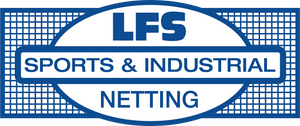When it comes to sports netting, the quality of material can have as much impact on your game as the equipment you use. At LFS, we understand the importance of providing top-tier sports netting that is cost-effective without compromising on quality. If you're a professional player, coach, or just setting up your home batting cage, you’ll want to know what's best for you - HDPE or Nylon netting.

HDPE (High-Density Polyethylene) Netting
HDPE netting is known for its durability and abrasion resistance, particularly in outdoor environments where contact with harsh weather conditions is inevitable. For those at the beginning stages of their sports training or for families looking for reliable backyard practice, our #30 HDPE nets offer medium duty reliability that can withstand regular use.

For athletes or teams moving up in their training intensity, investing in higher quality #42 HDPE nets would be more beneficial. These heavy-duty nets are designed to take more powerful impact and cater to more serious practice sessions, ensuring longevity even with more frequent use.
Features of HDPE Netting:
- Resistant to UV rays and weather-related deterioration.
- Holds shape and structure over time.
- Ideal for moderate to serious use for batting cages, spectator safety, and other sports uses.
Nylon Netting
The best option for your sports netting material, however, is Nylon. Heavy-duty #36 Nylon nets are crafted for the dedicated player. This material surpasses others in UV resistance and tenure of use. The resilience of Nylon makes it the go-to for professional environments or for athletes whose training is as rigorous as it gets.
Though the initial investment in Nylon netting might be higher, it pays off in the long run with its enduring quality. Plus, the performance of Nylon netting is unparalleled – with a superior capacity to absorb ball impact and prevent breakage, ensuring the safety of players and spectators alike.
Features of Nylon Netting:
- Supreme durability, perfect for heavy-duty use.
- Longest-lasting in UV exposure, making it excellent for outdoor setups.
- High impact absorption, beneficial in rigorous sports training.
- Ideal for professional use for batting cages, spectator safety, and other sports uses.

Which Netting Should You Choose?
Your choice between HDPE and Nylon netting should be guided by several factors:
- Frequency and Intensity of Use: Lighter, less intense use may lean favorably towards HDPE, while high-intensity, frequent encounters are best matched with Nylon.
- Budget Considerations: While HDPE netting may be more budget-friendly upfront, consider the longevity offered by Nylon and the potential cost-savings over time.
- Environmental Conditions: Think about the weather conditions the netting will face. While both are durable options, Nylon typically offers greater resistance to sun exposure and weather extremes.
- Safety Requirements: Assess the level of safety required, especially in professional or semi-professional settings. The superior strength of Nylon can provide additional peace of mind against potential net breakage.
Whether you’re setting up a new practice area or upgrading an existing one, remember the maxim "you get what you pay for" stands true for sports netting. LFS differentiates itself with custom-sized netting solutions tailored to your precise needs, ensuring you receive the finest quality product for your specific application.

Interested in Our Services?
Contact us now and get a personalized quote tailored to your needs.
Complete design and turnkey installation available.


